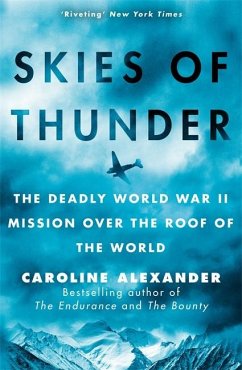'Riveting' - The New York Times
THE LITTLE-KNOWN STORY OF THE ALLIES' FIGHT IN WWII'S CHAOTIC AND LETHAL CHINA BURMA-INDIA THEATER.
In April 1942, the Imperial Japanese Army captured Burma, closing the only ground route from India to China. Supplies now had to be flown over the foothills of the treacherous Himalayas, on the most dangerous air route in the world.
Delving into memoirs, diaries, and official records, Caroline Alexander tells the story of the airmen who braved this perilous journey, flying unreliable aircraft through monsoons and enemy fire, with primitive navigation tools. The result is a litany of both deadly crashes and astonishing feats of survival.
Highlighting the efforts of units like the Chindits and Merrill's Marauders, and examining the political tensions between Roosevelt, Churchill, and Chiang Kai-shek, this book also exposes the fractures between the Allies and the impact of their decisions on post-war relations.
THE LITTLE-KNOWN STORY OF THE ALLIES' FIGHT IN WWII'S CHAOTIC AND LETHAL CHINA BURMA-INDIA THEATER.
In April 1942, the Imperial Japanese Army captured Burma, closing the only ground route from India to China. Supplies now had to be flown over the foothills of the treacherous Himalayas, on the most dangerous air route in the world.
Delving into memoirs, diaries, and official records, Caroline Alexander tells the story of the airmen who braved this perilous journey, flying unreliable aircraft through monsoons and enemy fire, with primitive navigation tools. The result is a litany of both deadly crashes and astonishing feats of survival.
Highlighting the efforts of units like the Chindits and Merrill's Marauders, and examining the political tensions between Roosevelt, Churchill, and Chiang Kai-shek, this book also exposes the fractures between the Allies and the impact of their decisions on post-war relations.








